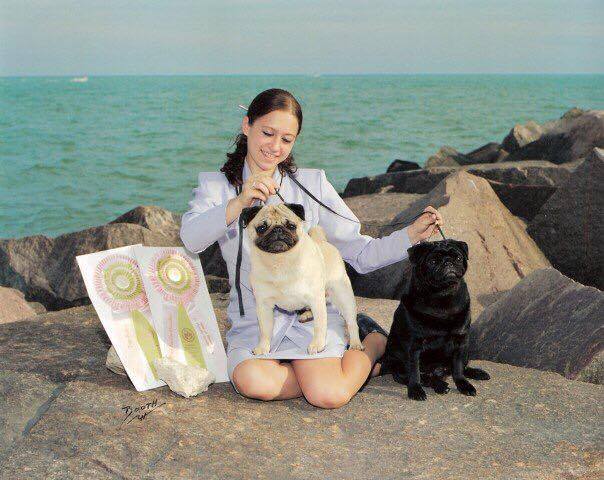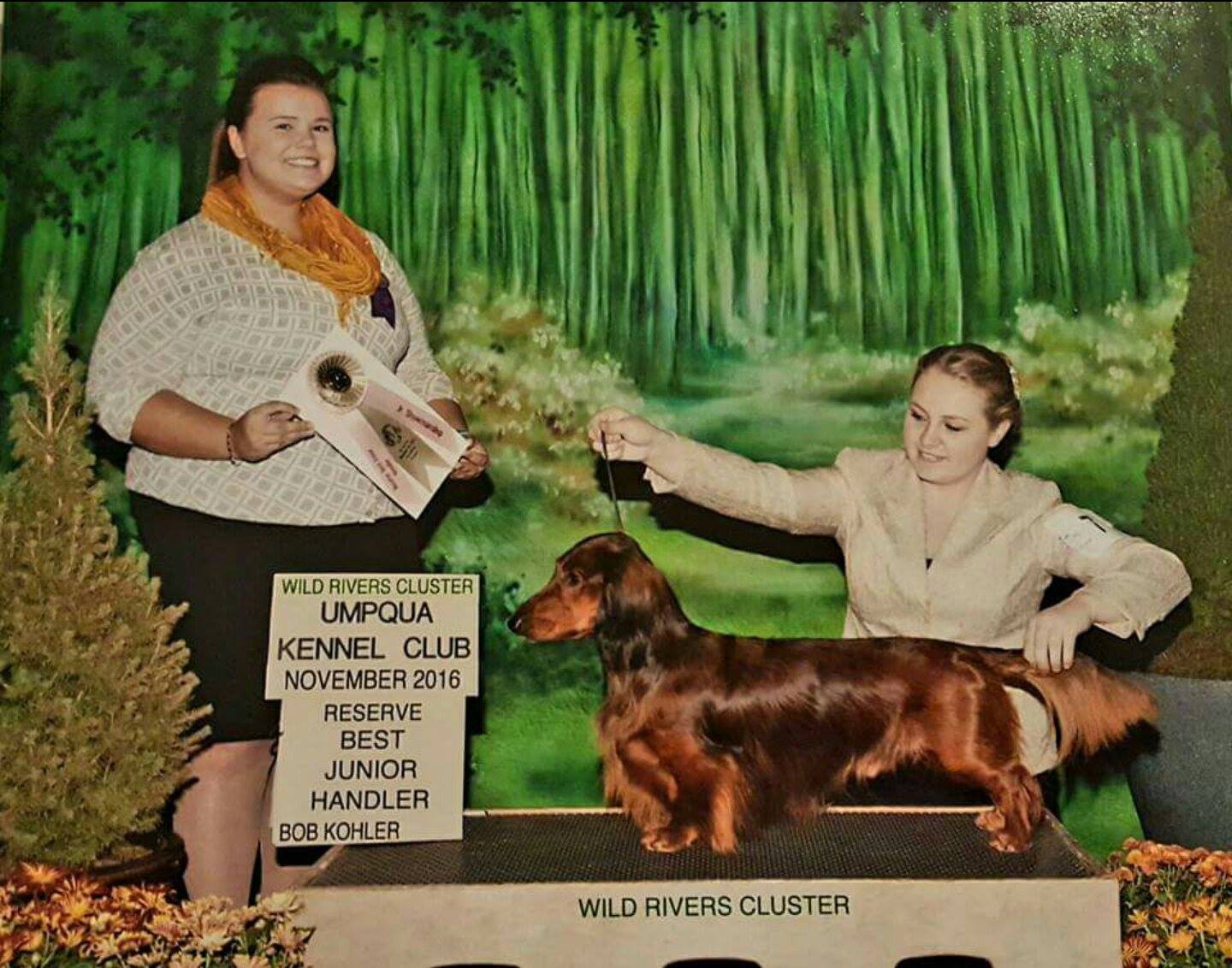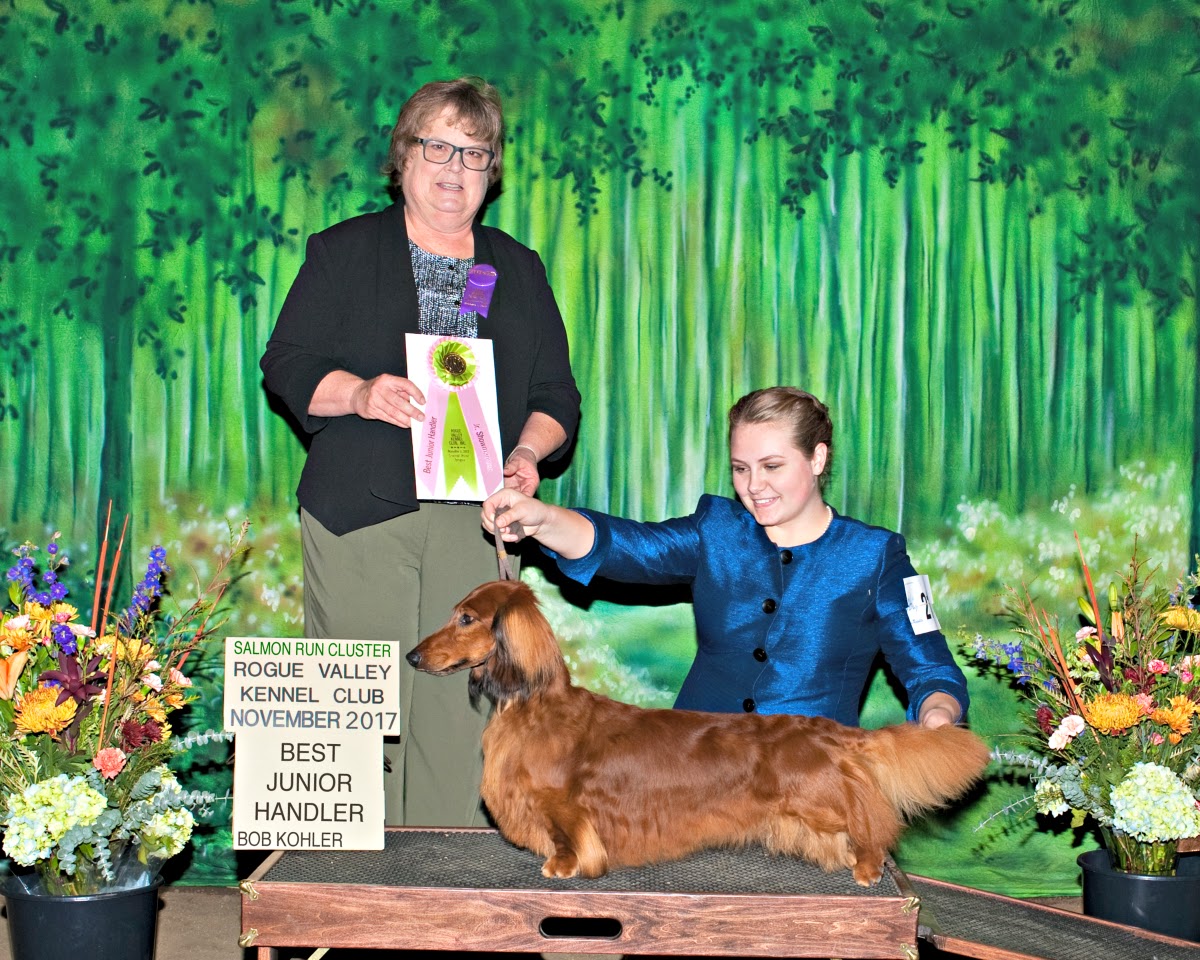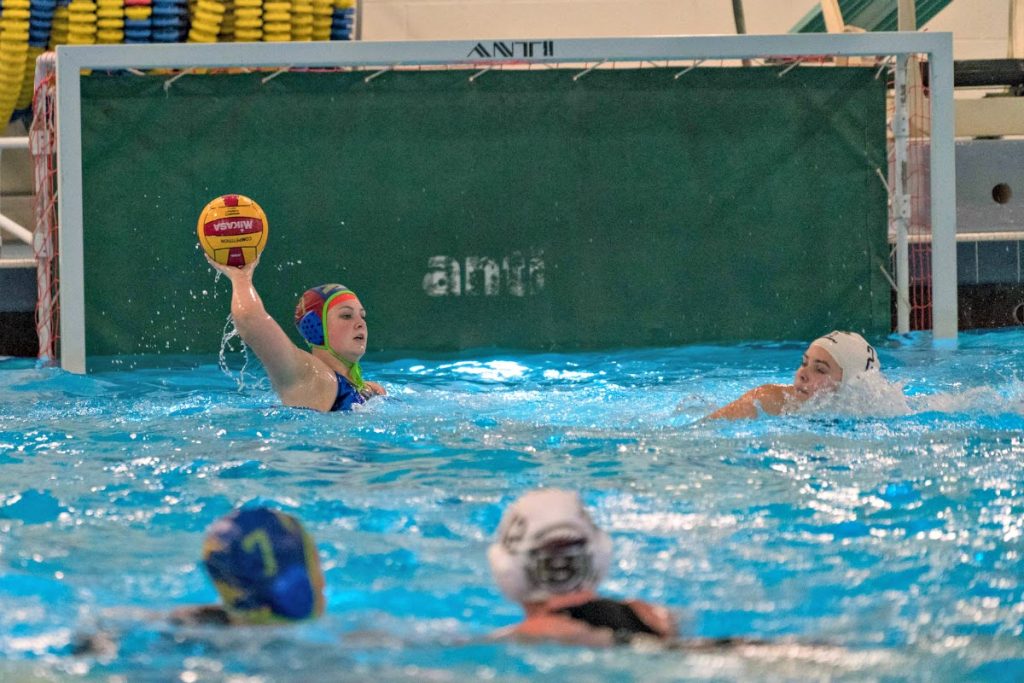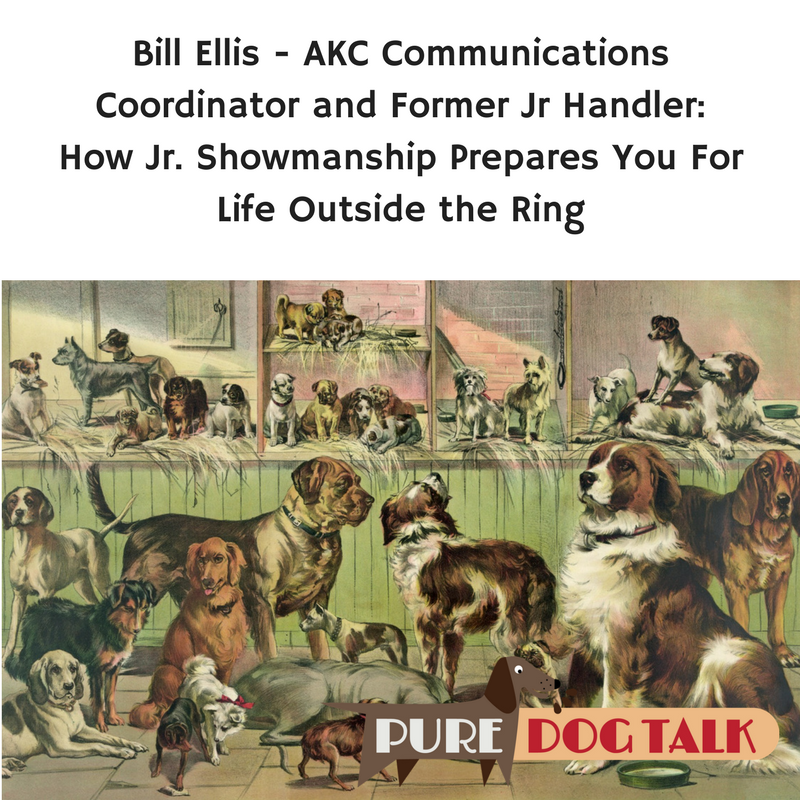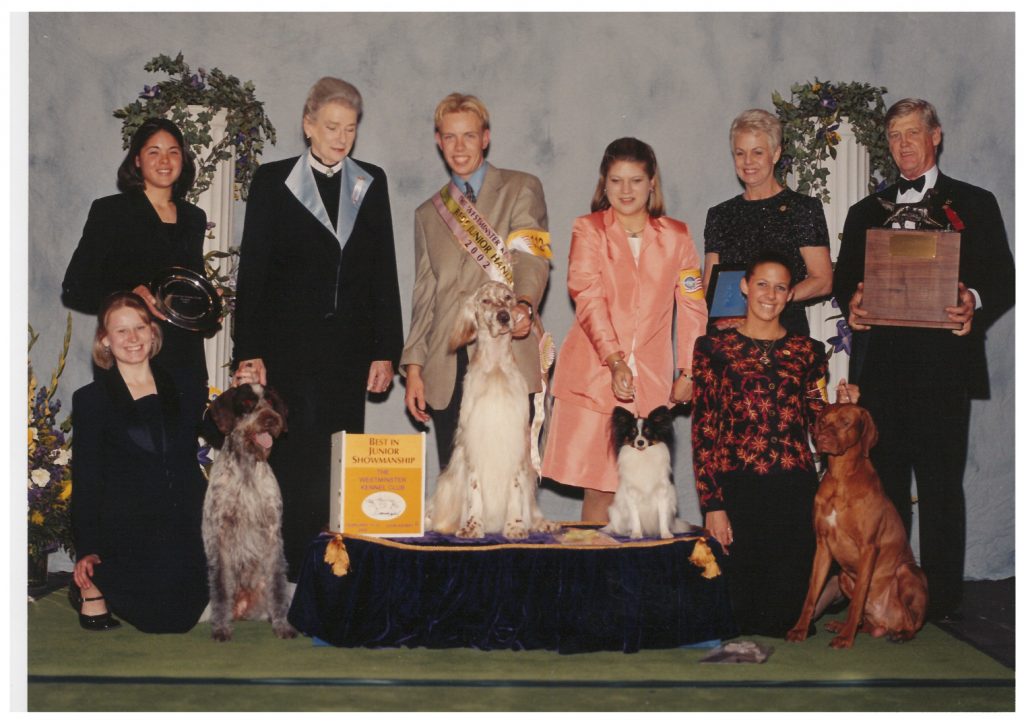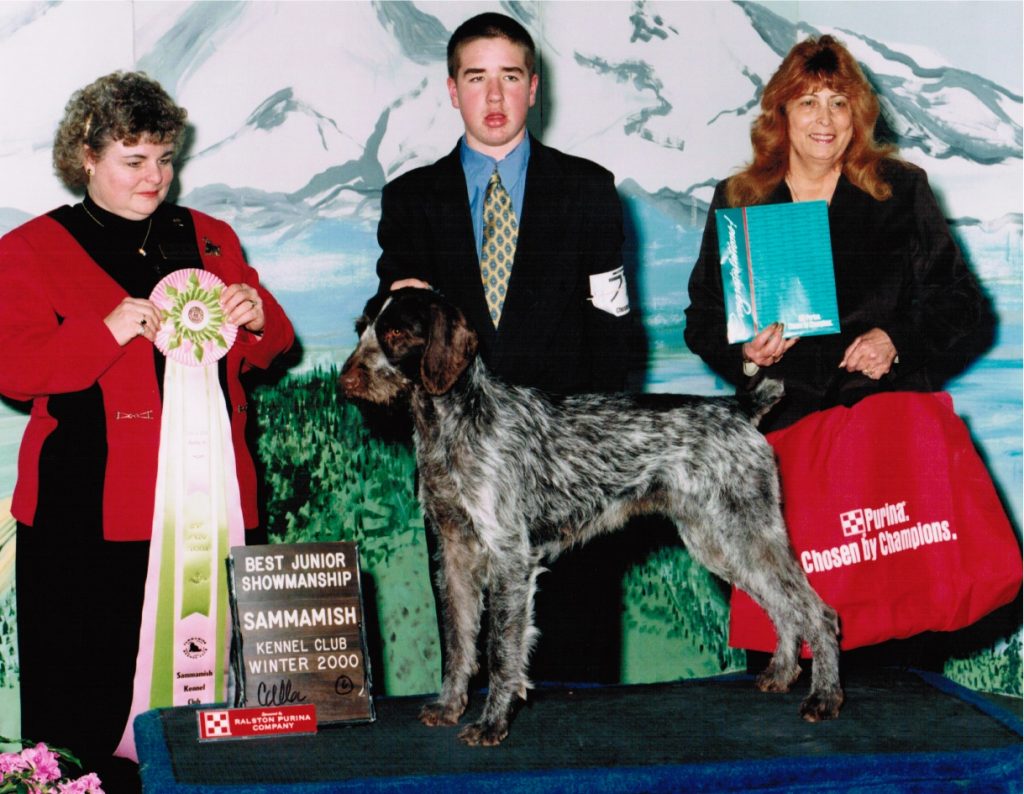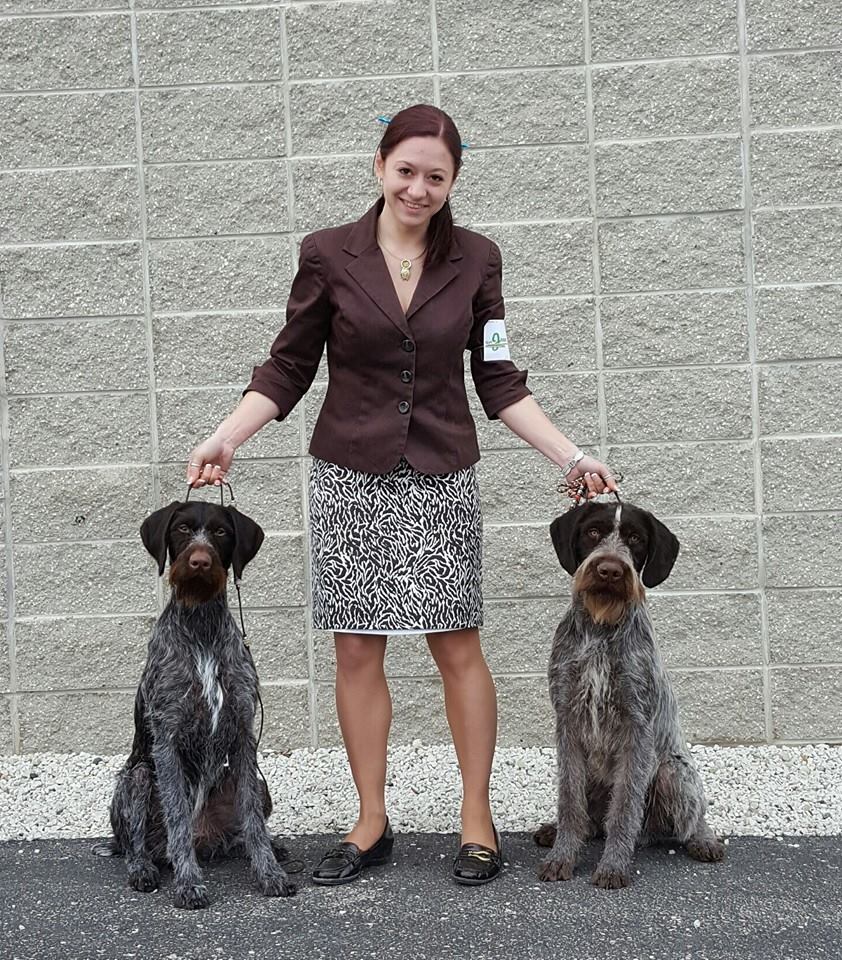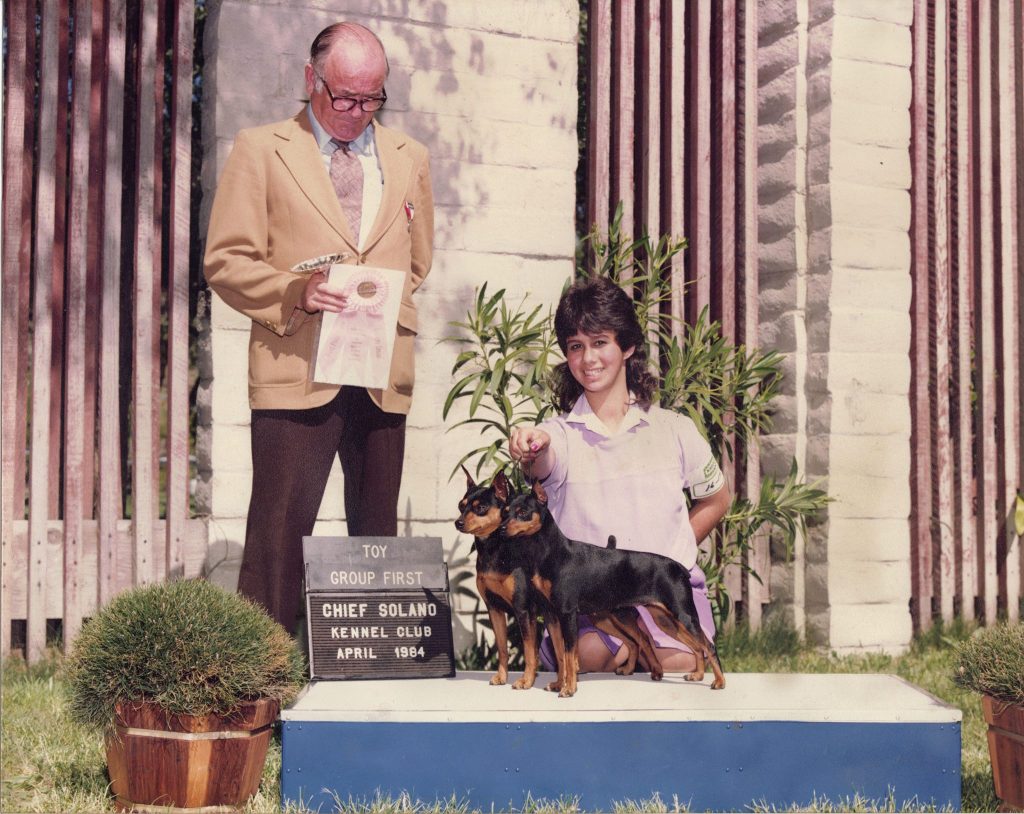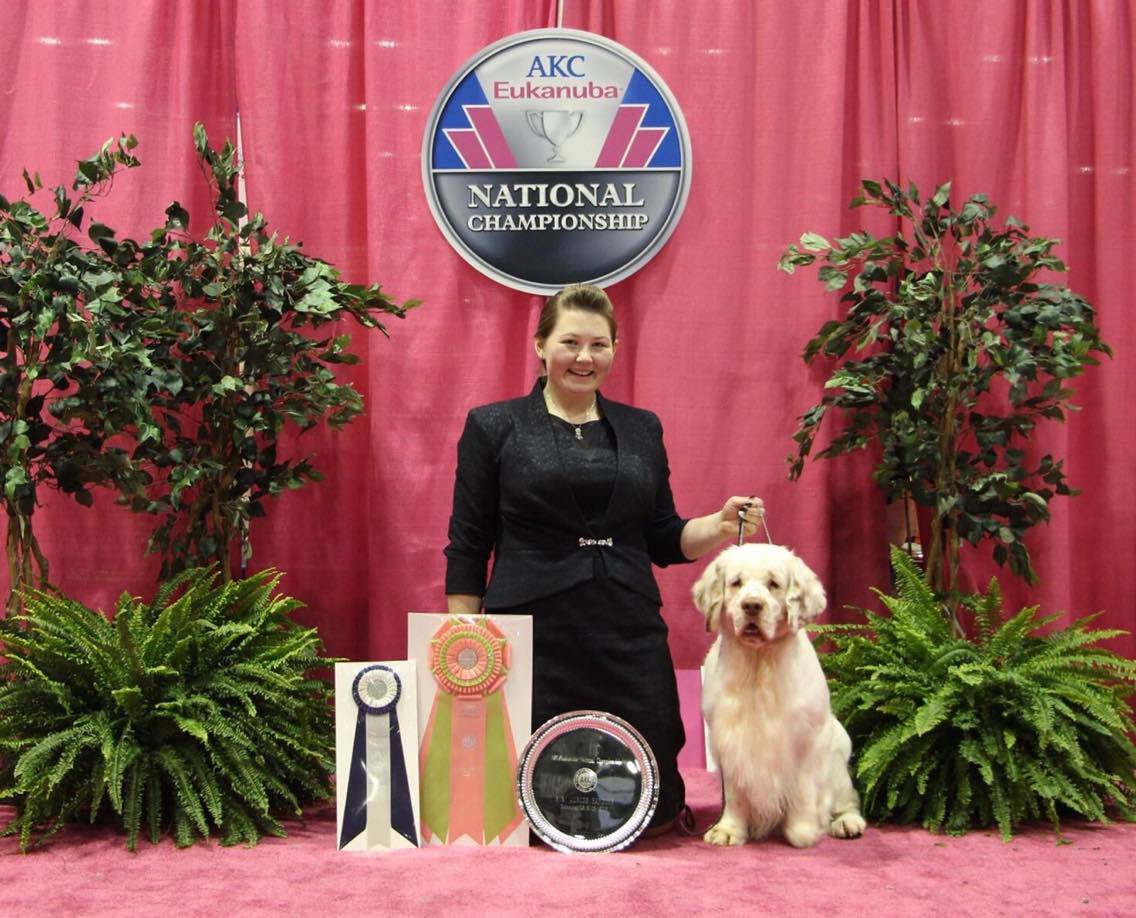136 – Junior Showmanship Lessons Learned, Gillian McKim
Junior Showmanship and the Future: Interview with Gillian McKim
For many of us in the sport of purebred dogs, whether we are breeders, owner handlers, professional handlers or judges, Junior Showmanship is where it all started. Our love of the dogs, the sport, the development of friendships, rivalries and knowledge… It all started in this ring.
Showing a Clumber Spaniel who *hated* it gave me, personally, determination, the ability to lose with a modicum of grace, the ability to win with pure joy and biceps of steel (from holding his 65-pound head up…) .
We talk a lot *about* Juniors, but I decided it was time we hear directly *from* a junior, in her own words… Laura Reeves
Gillian McKim and Pure Dog Talk’s Laura Reeves on Junior Showmanship
Gillian McKim is a talented young lady with ambition, goals and good hands on a dog. Take a few minutes to really *hear* what the future of our sport sounds like.
PDT: What did juniors give you?
GM: I’ve been around showing dogs for about 10 years. I started with my family. Dog shows and juniors have definitely taught me a great work ethic. You have to keep on going. When it gets hard, you have to keep on progressing. When you train a dog from a puppy, it takes patience. It taught me that not everything comes immediately. You have to keep working at it. It means a lot more starting with a new team and making it something great, than having it right off the bat. It means a lot more to you that you worked for it and you succeeded with it. I really enjoy creating the partnership.
PDT: What is special about dog show competition? How is it different than, say, your competitive water polo team?
GM: At dog shows I learned that win or lose, you take your own dog home. That you should be happy with how you showed to the best of your ability. And if you didn’t, try another day. There’s always another day at the dog show. Water polo was win or lose. Dog shows, it was nice to place in class or win, nice to know I tried my best. You’re always learning, every single day. The day you stop learning, that should be an issue. Even if I got second, makes me happy that the relationship (with the dog) is growing.
PDT: Tell us about learning the nuances of showing different breeds
GM: (I was) reading breed standards over and over… I’d have my mom and my breeders quiz me… You can’t show a dachshund the same as an am staf (American Staffordshire). It taught me how to go with the flow. You have to adapt, which is a great skill, that I’m learning still. It helps with life in general. You have to work with what you have. My adopted dog show family is helping me progress.
PDT: Who are your mentors, your heroes?
GM: I was fortunate to have a lot of mentors. You, Sandy McArthur, my basenji breeder, Wendy Snyder, my dachshund breeder, Chuck Murray, who teaches my handling class and really encouraged me. But I’d say especially my Mom and my Nanna, who are the ones who got me started and helped keep going when times got hard. (These mentors) meant the world to me, because it showed me that I had people who supported me and believed in what I could do, even when I didn’t believe in myself. It helped me push for tomorrow and what is to come.
PDT: What is your transition plan, your dreams?
GM: I personally believe you should learn the ways of dog shows and how to become a professional handler. A lot that goes into it. One needs to learn and pay their dues. After I compete at Orlando and Westminster, and graduate high school, I want to earn my four-year degree and possibly my masters in physical therapy. Because I really want that college background holding me up. …I know certain things will always be here. Dog shows aren’t guaranteed to be as popular any more.
I want to learn more about my breeds. (I want to) figure out where to go, (hopefully) become breeder. But I have to learn more before I do that.
I really like hounds and terriers. I like their versatility. I really enjoy Am Staffs, and I’m intrigued by dachshunds. You can be active with both (breeds), and I enjoy their background. Am Staffs have some issues here and there. I learned how to help them and help them to earn their “positiveness” in the breed. I greatly enjoyed getting a CGC on my Am Staff and definitely want to help the breeds better themselves.
PDT: What are the top 3 pros/cons to juniors?
GM: On the positive, it teaches a lot about yourself and how you can grow and become better in different in areas. Teaches communication skills. You have to “earn your stripes.”
Things to improve, I feel strongly about presenting dog according to the breed standard. It should be more about presenting the dog, not yourself.
Another positive, it creates a bond, to be a part of team and a family. Dog show family is a huge part of it. How to take success well and how to compromise with the losses. Learn how to take a step back and figure out what you could do better.
PDT: If you were queen for the day, what change would you make to improve dog shows?
GM: More learning. In juniors, learning to present to the standard, knowing your standard inside and out. From knowing how to present the bite all the way down to the details of the breed’s history. Knowing the trivia, knowing anatomy, understanding first aid, learning how to react to an emergency…
PDT: So what’s YOUR 411?
GM: I was just awarded best goalie in the Metro League for water polo. I’m a Navy brat. I grew up on base. I competed in judo, so I’ve always had a competitive side. Academics are super important. I believe in putting those first. Really like how Orlando (ANC) you have to have a minimum GPA. I wasn’t allowed to compete at dog shows if my grades dropped below 3.5… Students come before athletes. Athletics come and go, people can get injured. Academics are always there and part of your future.
PDT: Tell us about some of the scholarship opportunities you’re finding.
GM: Like a lot of kids, we don’t have a lot of money. Loans and scholarships are what I have learned to work with. A lot of scholarship money isn’t used. I really appreciate the American Kennel Club spending thousands of dollars in scholarships to support their juniors and help them continue their secondary education.
PDT: What are you most looking forward to seeing on your first trips to Orlando and New York City?
GM: Christmas in Disney World and trying to find places that will teach me different things in New York.
From the American Kennel Club:
“A Brief History of Junior Showmanship”
Part of the mission of the American Kennel Club is to “Take whatever actions necessary to protect and assure the continuation of the sport of purebred dogs.” The AKC’s Junior Showmanship Program is just one example of the kennel club’s commitment to fulfilling this portion of its charter statement.
In the late 1920’s a group of dog show exhibitors led by Mr. Leonard Brumby, Sr., decided to develop a special competition for children. The purpose of the competition would be to introduce a new generation of fanciers to the sport and to give children the opportunity to measure their skills against those of their peers. The children would be judged by how well they presented their dogs with respect to the nuances of the breed being shown. The first Children’s Handling class was held at the Westbury Kennel Association show of 1932, and quickly became a popular feature at other AKC events.
In 1949 the Professional Handlers Association donated a trophy in honor and memory of Mr. Brumby to the winner of the Children’s Handling Classes at the Westminster Kennel Club show. This trophy is still awarded to the winner of the Junior Handler competition at Westminster and is the most sought-after prize in the sport.
Children’s Handling classes were very informal when the program began. The judging of the classes would normally start whenever the first breed ring became available. The judges were usually professional handlers themselves, and the participants were allowed to use any dog that was available to them.
In 1951 the name of the competition was changed from Children’s Handling to Junior Showmanship. Twenty years later, in 1971, the American Kennel Club recognized the virtues of Junior Handler competition and granted official recognition for these classes at AKC events.
The Junior Showmanship program has grown and changed in dramatic fashion since its humble beginnings in 1932. The AKC now has guidelines for participation and adjudication of this event. For example, juniors must be between 9 and 18 years of age to participate. They must win three first placements in the Novice class before advancing to the Open class. Judges must be approved by the AKC to judge Junior classes, and the dogs that the junior handlers exhibit must be owned by them, a member of their family, or a relative.
In 1999 the Junior Showmanship program was expanded to include performance events. Currently, a Junior Handler that handles a dog to a performance title will receive a certificate from the AKC acknowledging this accomplishment.
The American Kennel Club also awards Scholarships to deserving Junior Handlers to encourage them to continue on with their education. The AKC awarded 38 Junior Handler Scholarships in 2002. The Board of the American Kennel Club has just increased the Junior Scholarship Fund from $60,000 to $100,000. This can truly be seen as affirmation of the AKC’s commitment to the youth of our sport.
Junior handlers become ineligible to compete in Junior Showmanship classes at the age of 18. In most cases, their participation in the sport of purebred dog does not cease once they have “aged out” of competition. From the ranks of Junior Handlers we find the future breeders, AKC Club Members, approved judges and Registered Handlers who will be the caretakers of our sport in the future. We see many of these kids go on to pursue careers as veterinarians. One former Junior is now the CEO of the Orthopedic Foundation for Animals; others have gone on to serve as Board Members of the American Kennel Club. Still others have gone onto make their contribution to the sport as AKC employees.
While the Junior Showmanship program itself has gone through changes, the concept and reasons for its implementation have remained the same: to encourage participation in the sport by young purebred dog enthusiasts; to teach good sportsmanship, win or lose; and to educate the next generation of the fancy. So the next time you find yourself at a show with a few moments to spare, stop by the Junior Showmanship ring to witness the AKC’s commitment to its mission statement and the future of our sport.”
Junior Showmanship Handbook from AKC
https://images.akc.org/pdf/rulebooks/REJRSH.pdf
Junior Showmanship FAQs
http://www.akc.org/events/junior-showmanship/faq/
AKC Kids Corner
http://www.akc.org/kids-corner/the-junior-handler-program/
AKC Junior Showmanship Finals
http://live.eukanuba.com/video/3873/junior-showmanship-finals
AKC Junior Recognition Program
http://www.akc.org/events/junior-showmanship/recognition-program/
108 – Bill Ellis and Junior Showmanship: How Junior Showmanship Prepares You For Life Outside the Ring
Bill Ellis, once a former junior showmanship competitor, is currently Communications Coordinator for the American Kennel Club.
Bill talks with Laura Reeves of fond memories and how what he learned through Junior Showmanship prepared him for life outside the ring.
Laura Reeves
I have always believed that Junior Showmanship and a childhood spent raised in and around the sport of purebred dogs is invaluable in many diverse ways.
After all, Mom enrolled me in dog care 4-H in fourth grade because I was “shy and retiring and lacked people skills”… Forty years later, who I am is due, in large part, to what I learned there and by continuing on into the sport of purebred dogs. Literally, my best friend in third grade was the school librarian. I was the only eight year old kid who knew the entire Dewey Decimal system by heart since I spent most every recess and lunchtime shelving books with Mrs. Young.
While I’m still the head bookworm at heart, I learned how to cope, how to get along, how to lead as well as follow, how to manage time, take responsibility, have a thick skin for criticism (a *definite* requirement in journalism and the dog show world), how to make friends, etc ad nauseam. I have an expensive college degree that broadened my exposure to the outside world, but I would never have survived it without the years spent with dogs learning how to be “human.”
Bill Ellis and other former Junior Handler’s skills
When I interviewed Bill Ellis on this topic, it struck me that all of these “transportable skills” as the human resources people like to call them, are not unique to me. So I reached out to the fancy for their thoughts on the topic. Turns out, as usual, I didn’t even know the half of it!
From special education teachers to emergency managers, from researchers to factory workers, from lawyers to stay at home moms, the uniting theme is the work ethic, compassion, confidence, grace under pressure, skillful multitasking and so much more that young people acquire in this sport.
Thanks to former juniors and assistants
Tremendous thanks to the dozens of former juniors and assistants who responded to my inquiry. I’m including a great many of their stories, comments and observations here. Mostly because so many of them were so intense, specific and concrete.
Meanwhile, for all of you out there who think Junior Showmanship is nothing more than a training ground for future professional handlers, think again. This part of the dog fancy is busy training up an entire miniature work force of individuals with determination, punctuality and perseverance that are sadly lacking in too many youngsters outside our world.
Former Junior Handlers and/or Assistants: Where Are They Now?
Heather Hale:
My introduction to the sport came via none other than Cie Harris and her giant Irish Wolfhounds in the mid 90’s. I wish I could say what drew me into the sport beyond being a preteen girl who didn’t have the first clue as to how to dress to impress boys and virtually no real social life, so naturally going to dog shows and engrossing myself could do nothing to further ruin my already stellar reputation right?
Somewhere along the way, I convinced my parents to let me tag along and “help” Cie at a dog show. From the first instant I was hooked. I loved this exciting and crazy world, the smell, the odd way people dressed and ran, but most of all I loved the dogs. I loved the sizes and shapes and their natural ability to love and want to please their masters. I didn’t have the first clue that I would be entering what has become a mild obsession for me my entire life.
Then I met you, Laura Reeves, a professional handler and quite possibly the scariest and nicest woman I had ever met. You didn’t need anyone, a man, children, or close friends to sit and have coffee with and gossip about other friends. I was all at once stunned and intrigued, certainly if you could have that kind of confidence and push around a 150 lb Irish Wolfhound, then there was something to be learned from you.
My fear was matched equally by my respect for you and you began to teach me about everything that is dog shows; waking up at 6 am to walk and bathe dogs, schlepping crates that were bigger than me “the proper way”, how to properly strip a coat, how to load a Dodge van (something out of Tetris), how to not get a run in my panty hose (because we were down to the last pair), the importance of good flat shoes and pockets in your show clothes, and how to set up x-pens, grooming tables, mats, and every other sort of equipment (and do it quickly), but the most important thing I learned was that the dogs’ safety and comfort were paramount. These dogs not only trusted us to do the right thing, but they loved us and counted on us every minute. They performed for us, and played with us when it was over. I learned that it was the most thankless job I would ever have, but also the most rewarding one.
I am not sure I will ever match the feeling I had when Ric Byrd gave me Best Junior from the Open Junior class, beating Candace with the Dalmatian, or having a crush on Jorge who showed a Beagle in juniors.
So many lessons learned. I am now in wine sales, (which is arguably the best career in existence) but to be in any sales one must possess a certain level of confidence, certainly hard work, and the innate ability to connect to people you barely know. I am certain that my early years in dog shows gave me these qualities. I am married, I have 2 wonderful children, but I also know that I am capable of handling a 150 lb dog.
I have a love for dog shows that will never go away. When I was going through a somewhat messy divorce I did what any dog show enthusiast would do; I flew to Texas, bought a Beagle puppy, brought him home, bought a motorhome and spent a year showing him. It was the time of my life. He became a champion in less than 6 months, and the two times a judge put him BOB from the 12-18 month class we took back to back G4s. If I hadn’t met my husband and if Jake had filled out and didn’t look like a Beagle bitch instead of a dog, I would have continued to show him. But alas, my life went a different wonderful way.
I still think that someday I will find myself back in the ring, hopefully this time it will be with my husband after our kids have grown and we are doing it for fun because that is what dog shows have always been to me. A source of good memories and lots of fun. I miss the “dog show world” and a part of me is always envious to see those still in the sport, but I don’t think I have seen my last show ring. Or at least I hope not.
PS I chose wine sales because I get paid to drink wine, and who the hell wouldn’t want to do that? I have a bachelors degree in Civil Engineering, but quickly found that I am not a desk person and I multi task way too well to try and fill 8 hours behind a desk. Also could be attributed to my first job as an assistant. Nothing says multi tasking better than that!
Natalie Grochowski
I came from a non dog family but showed an English Cocker in juniors, aging out in 2010. I worked for Kellie Fitzgerald and Chris Berg from 2008 and onward for several summers and occasionally through college when I could. I now work in Federal Management Consulting, particularly in program management activities for agencies within the Department of Homeland Security.
Kellie and Chris were huge mentors to me and always encouraged me to get an education outside dogs- that I could always come back to dog shows if I wanted to. Working for them has honestly shaped my life in so many ways, most notable the work ethic it takes to be successful in dogs translated to my education and now my work life. Working for them honed my attention to detail, appreciation for the amount of behind the scenes work that goes into any successful product (dog, or client presentation etc.), and most importantly to never cut corners – that if anything is worth doing, it is worth learning the right way. One of the reasons I wanted to work for them was because I always admired Kellie’s sporting dog grooming and wanted to learn how to do it well too – the importance of giving even the smallest tasks your all had always stuck with me since the first time she said it and it has helped tremendously in my job. The idea of mentorship and finding lessons out of every interaction has also brought me leaps and bounds in my work life. I learned so much by listening at dinner to so many great dog people, and the idea of being a good listener (as opposed to pretending to be an expert on Day 1) is still with me today.
I didn’t pursue a career in dogs because I wanted the flexibility to show my dogs and have my own breeding program and do shows on my own time. I was worried that if I did this as my profession, I would burn out and resent it, but if I did this as my release and hobby – I’d stay motivated and passionate about learning and being involved. If I feel frustrated with dog shows or anything, having a life outside dogs allows me to step away and then come back when I am ready (I always do!) and see things with a fresh and renewed perspective which I think has kept me excited and in love with the sport.
Coming full circle- I actually am in the process of getting my junior showmanship license and can’t wait to give back to the sport. I am getting ready to marry a non dog show person (after vetting him at the dog show of course) and he keeps me grounded while totally supporting my passion as well. I got my first show dog since college about a year ago and am excited to learn about my new breed. To be honest, there are days where I listen to your podcast on my drive to work or on my lunch break and wonder if I made the right decision- but it is also through your podcast that has inspired me to get more and more involved with dogs at different levels and opened my eyes to the different possibilities within dogs to make a difference.
Demery Paladichuk
“I spent my teenage years working as an assistant for Randy Schepper, Kevin & Diane Chestnut, and most notably Shea and Tiff (Skinner) who I still have a very close relationship with to this day (and love like family). I spent all this time with a specific plan in my head: go to college, get my degree in business (as the “back up plan” everyone talks about), and return to dog shows.
I knew I wanted to go to college, and I don’t know if Shea and Tiff, and especially Don Rogers would have been very happy with me if I hadn’t! He especially told me to go every chance he got. So I went to WWU, took some classes, hated the business ones, made friends, and started volunteering. It broke me out of the dog show bubble I had been immersed in and opened my eyes to what all else was out there.
I started doing a lot of thinking about what I wanted my life to look like 5, 10, 20, 50 years from now, and what I wanted my life to mean. As much as I loved, and still love dog shows, at the end of the day (to me), it’s running around the ring with a dog. To me, dog shows are fun, but don’t provide me with a purpose in life.
I personally couldn’t justify knowing that there are human beings suffering, dying completely preventable deaths, and with an education I could make a difference in their lives. How do you compare that to a dog show? So in a few months I’ll be a nurse practitioner, and even better, will have a reliable job with a great salary, job security, benefits, PTO, and weekends off… which are all things you don’t exactly have being a professional handler.
With that being said, dog shows will always have a place in my heart. And I have absolutely nothing against professional handlers, it’s just not how I ultimately wanted my life to look. I’m now a regular status all-breed juniors judge. I’m super excited to finally be (almost!!) done with school as it means I can get more involved in dog shows again, and I’m lucky to co-own some beautiful puppies with Kim Bullard as well as two well-known springer breeders who I’ve already learned a lot from and can’t wait to keep learning from. I will hopefully be getting my own puppy within the next year and will start my breeding program (most likely in collaboration with Kim Bullard) from then on. In terms of skills I’ve carried on from dog shows, there are so many.
Most importantly, I think that working for a professional handler teaches assistants customer service, and not in the “the customer is always right” kind of way. More of how to handle situations that aren’t always pretty, how to interact professionally, how to always treat others with respect, and taking responsibility for your actions.”
Matt Grimes
I got my first show basenji when I was 10 years old from Katie Campbell. I was brand new to the whole dog show thing and when we purchased our first basenji my Mom asked if I would show her. After about a year, showing her with Katie and Mary k, they introduced me to their friend Laura. Laura needed an extra hand one weekend and from there on forward I worked for Laura for about 6 years.
I traveled every weekend through the summer and even during the slower time of the season with Laura. I think I have been to every county fairgrounds in Washington, Oregon, and Idaho. I learned a lot of life skills from her. Laura helped me build the foundation of sportsmanship, work ethic, professionalism, and taught me the importance of building professional relationships.
Upon graduating high school, I had the honor to serve in the Marine Corps Infantry from 2004-2008. Currently, I am a supervisor at Puget Sound Naval Shipyard. The life experiences presented to me during my time showing dogs and the people I have had the opportunity to meet, has played a major impact in my successes today!
Alexia Rodriguez
“Growing up I had very low self-esteem. I was extremely shy and had a hard time interacting with other kids that were my age. As an only child, I always had difficulty connecting with my peers. Junior showmanship gave me something to connect to other kids with. It broke the ice, so to speak, so that I had something to talk about with other people. The more I learned about dogs, the more comfortable I felt talking about them.
Right now I work for a software company doing technical support and some light coding. I guess I didn’t really choose this profession but I’ve always been good with problem solving. My original profession was in Day Spa and salon management.
I am still heavily involved in dogs. I currently breed, show and compete in IPO and Rally with my Cane Corso and Lowchen. I also just received provisional judging status for Japanese Chin and Corso and am really enjoying my foray into this next chapter in the sport.
Training my dog, going to dog shows and being rewarded with a win or praise from my peers, boosted my self-confidence and gave me something to work towards. I did not grow up in a dog show home. Instead, I got involved because of a flyer at school that advertised an “AKC fun Match”. My mother supported me in my wish to try out dog shows and would cart me around to various shows. From the dog show world, I also found a profound sense of “family” which, for an only child growing up with a single mom, was instrumental to help boost my self-esteem.”
Maryke Nau
“Everything I am is because of the sport of dogs. I learned that I love teaching from 4H and handling class, so i made it my job. (Having skills at training dogs is VERY applicable to teenagers too!)
The biggest thing I learned was how to have a goal and make steps towards it. To know when to back track and try something else. To know when to change goals completely. To know what is in your power and what isn’t and accept that. I learned how to compete and be defeated. I’ve learned to constantly evolve and never settle for complacency, which has been endlessly beneficial is becoming a leader at my career.
I love dogs, and do the same whether I show every week or once in a year, but the connection with them when we go in the ring is unparalleled. If I never showed another dog I wouldn’t be sad but I would miss the people. The people I have known the longest outside of family are from dog shows. We have seen each other go through many phases of life and are always excited to see each other, mostly. I have learned to fight and make up. I learned about relationships. A lot. A lot about long and short term relationships.”
Rémy Smith-Lewis
For me dogs taught me so much respect and responsibility. The same things I use today in my role at Google and the past companies I have worked at.
Ann Foley Lindstrom
Former Junior and assistant, now a teacher.
Involvement/Why I didn’t become a handler
I started at 13 in Obedience, bought my first show dog, a lovely Belgian Tervuren, at 16. My dog was an absolutely terrible hell beast and regularly embarrassed me in the ring. I did not do well in Juniors. It’s hard to look good when your dog is kangaroo hopping. I worked my butt off with her and learned a lot. I became involved in agility and herding. I traveled a little bit with Sheltie handler, Judy Stachowski. I had a blast and enjoyed every moment of it.
I planned on being a professional handler. I had kennel plans all drawn up. I was going to teach for a few years and save my money to buy a house and build a kennel. I guess 19 year old me didn’t realize how little teachers made, but weekends and summers are off, right? Perfect for shows!
I drove 15 hours from Chicago to Atlanta for a dog show. I was walking back to the car and looked at a row of RVs with x-pens and dogs. At each RV, tarps haphazardly covered the x-pens to protect the dogs from the ongoing drizzle while handlers had dogs up on tables, fighting with the humidity and dampness. Everyone looked miserable at that moment. I stopped and thought, “What am I doing here? Is this what I want?” Showing is fun, dogs are amazing, the people are great. But hauling stuff in and out every weekend, or getting worked up over mud, or the general franticness of it all… it just hit me that this wasn’t what I wanted as a long term career.
Current involvement
I’m still involved in dogs at age 35 and I am still a teacher. I still do conformation and I’ve done varied amounts of obedience/rally, agility, and herding. I maintain the herding statistics for the ABTC. My children are beginning to do Juniors and we’re getting to a point where I can share this great hobby with them. My lovely girl Tipsy won BISS from the Veteran’s class, and the very next weekend she piloted my 3 year old son around the ring for his first time in a Pee-Wee Juniors class (UKC). Sharing our lives with dogs is what this is all about.
Current job
I am a teacher for at-risk high school students. I have no doubt that my experience with dogs has greatly impacted my success as a teacher. I primarily do intervention work to get students back on track. This is basically the equivalent of convincing a terrier to do obedience. Where many people would throw their hands up in the air, I roll up my sleeves and double down. I spend a lot of time figuring out what motivates students and slowly shaping positive behaviors.
One time I was in a meeting with several administrators, counselors, and teachers regarding a student’s poor performance. I used the phrase “back chain” to describe how I was reteaching material, and I momentarily panicked because I couldn’t remember if that term was used only for dogs. Fortunately most terms used in dog training and behavior are used in teaching humans, so I ended up looking good. My experience with dogs and training gave me tremendous insight into working with teenagers, not just the learning and teaching component, but also patience, compassion, and an appreciation of effort.
Margaret Shelley
“I worked for Doug and Mandy Carlson for 3 years in high school and Janice Hayes for 2 summers in High School and starting college. I also helped Michael Shepherd a few times as well.
I am currently working as a Corporate Sales Manager for Main Event. I choose that route because it was more money and had weekends off. I loved being an assistant and I would have stayed, but Dottie James made me go to college (I didn’t finish but I was able to land a great a job and haven’t had a need to go back yet).
The skills I learned from being an assistant is how to handle clients which I use daily, how to build relationships with clients or other professionals. Also I learned at a young age how to interact with adults which has been so beneficial as a young professional.
I’m not in dogs but it’s something I will be back in once I get a home and my social life slows down enough for me to have time for a puppy to show.
I tell people all the time that being in Juniors and working for the handlers I did taught me way more than I learned in school. It taught me social skills, how to hold yourself together if something doesn’t go your way (like losing a big juniors class), how to keep track of finances and expenses, the importance of being up to date on billing your clients (I do that all the time now), and also how to run a business.”
Moriah Hubbell
“I brought myself into the dog world at 13, when I purchased my first show puppy (Samoyed.) My parents and family had no knowledge of the sport, so I was fully guiding the train. I trained my puppy and took her to my first show at 6 months old. It was hard and we got no where at first. Juniors was impeccably challenging, having no formal training in how to handle. I learned, though, and my puppy learned. Throughout our nearly five year journey with juniors, I learned more than I could ever express.
I learned how to win graciously and loose gracefully. I learned that just because you come in behind the curve, doesn’t mean you can’t climb to the top. I learned that dogs are my passion and my dream, but that my relationship with them is more important than any win.
For a time, I worked as a handling assistant. It was temporary, but it confirmed my thoughts that professional handling wasn’t for me. I wanted some of my weekends to go hiking with my dogs, my week days to work a 9-5, and my love for showing to remain a hobby and a passion rather than a career. I wanted to show and breed my dogs, and for that to be my focus.
So, I decided to go to college for Marketing. Random choice, right? Not really. I know that my skills with dogs will benefit my marketing career and that my marketing career will benefit my endeavors with dogs. I’m happy with the decision I made and I am forever grateful of the lessons junior handling taught me, it’s something I encourage the children that I teach to take part in and it’s something I hope my own kids will take part in one day.”
Sarah Beaird
“I did Juniors and 4-H growing up. I loved being in the ring and as an adult, it was always my goal to get back there. I love animals and when I got hired at the Henry Doorly Zoo in Omaha I thought I was starting my dream job. There were many things that I loved, but I noticed that when I got home I wanted space from my own animals…. and that became unacceptable to me. Giving my energy to my own animals should come first. They are the most important.
After moving back to Oregon, I spent a few years running dog obedience classes, and once again working with animals became a chore. It wasn’t fun. However, when I took a break from it I had a group of people who had been in my classes before and had new dogs and wanted me to do a class. I suggested we just meet once a week to “work dogs”. It was still almost exactly what I had done in my formal classes, except no money was involved and we usually ended by sitting down and sharing whatever snacks and wine each of us had brought, and it was lovely.
So — that works for me. I’m always happy to take another dog into the ring as long as it doesn’t conflict with my own. I’m happy to take another dog to a show with me if I’m going, but I don’t want any money, and therefore no expectations so I don’t have to feel the stress that I’m “working”. Showing dogs is a fun hobby for me. I want it to stay fun, and when money starts to exchange hands, it becomes a chore and I would feel obligated to put the client dog above my own, and I would resent myself for that.
Also, regardless how my dog does in the ring, I always have other goals set for myself for the day/weekend that often have zero to do with ribbon color. My real job has nothing to do with animals, so I miss them during the day and can’t wait to see them and spend time with them when I’m home. For me, a life full of animals does not mean a career working with animals. I get more, and my own lovely creatures do too, if I have the balance of a job that doesn’t have anything to do with working with animals.”
Kelly Schur
2nd generation breeder owner handler, former junior handler – currently a special education teacher
I was an assistant to several professional handlers throughout junior showmanship and following aging out. I loved learning about new breeds, getting my hands on different dogs, and the camaraderie and relationships that were built. Some of my favorite memories are from experiences as an assistant.
However, after several weeks on the road where we only had a one or two-day turnaround and traversing a dozen states in less than a month, I realized that it just wasn’t a life for me. I wanted something more stable and consistent.
Time in dogs and dog shows set me up for success as a sped teacher. I learned patience, attention to detail, and how to establish, maintain, and strengthen relationships, especially with those who are not necessarily open to the relationship to begin with.
I chose it because I wanted a profession that would be a challenge but in which I felt I could make a difference. I participated in a therapy dog program with my old juniors dog and first group winning special, and I saw what a difference people could make in children with special needs. My ultimate goal is to explore animal related therapies and develop a program to work with our beloved purposefully bred dogs to improve school life for students (and staff)!
I still handle as a hobby, breed Pugs under the Brenich prefix with my mom, and have expanded to duck Tollers – field and conformation… I participate in conformation, field (hunt tests/hunting), rally, obedience, and am trying other sports (barn hunt, nose work, lure coursing, dock diving).
Kris Wiltse
“I learned that winning isn’t everything and when you lose you don’t really lose anything you gain knowledge of what needs to be worked on. I learn patience working with the puppies and that you just have to keep trying till you figure out what works just like with dogs, not every child is the same. I learned how to manage time. Having to be at a certain ring with a bathed and groomed dog to having to have the kid brush teeth dress for bed and in bed by a certain time or to school bus.
Teaching dogs is VERY SIMILAR to teaching children you have to praise the good and depending on child/dog either discipline or ignore the bad. I think the most important 2 things were to put the dog away and walk away when I got frustrated. And two I learned respect. I learned to respect the fact that this dog or person is alive and has feelings and doesn’t always understand why I do what I’m doing and to respect the fact that they may not want to do that right then and thats ok.”
Kim Bullard
“I started in 4-H. My 4-H leader talked my parents and I into trying Junior showmanship. I worked for a few handlers during my Juniors career then for several years following with the idea of becoming a handler.
I remember one weekend on the Montana circuit we had a family emergency and I felt helpless being so far away. I realized that traveling every weekend just wasn’t something I wanted to do any longer.
I still miss it on occasion, but also fully enjoy being able to show my dogs on the weekends I want to. I am still very much involved with AKC, breeding and showing English Springer Spaniels and co-breeding Golden retrievers with a friend whom I’ve been showing dogs with for over 10 years. I’ve mentored a few juniors and am also a member of several of my breed clubs and the Whidbey Island Kennel Club which I am on the Juniors committee and we host an event for the Junior handlers at our show every year. I was (and still am) quite a shy person and dogs helped me break out of my shell a bit being around so many likeminded people.”
Taylor Marshall
“I was a Jr from ages 12-18, also assisted for Helen (George) roughly the last three years.
While I would’ve loved to go the pro route, my parents wanted me to have a fallback option so off to college I went. During those years I moved out, met my fiancé and had to get a job to pay my bills. I lucked into the job I have now (it’s not related to my degree and I got it before I graduated).
Specifically, my time management skills and multitasking skills have carried through. I think the biggest skill set that has benefitted me the most in my job is handling things under pressure. Whether it’s numerous clients, working on several jobs at a time, meeting quick deadlines, etc. it’s still nothing compared to having numerous dogs/breeds in the ring at a single time. Being able to focus on completing a single task while not worrying (but also not forgetting) about other tasks is one of my strongest advantages in my field.
Another thing I notice that carried is confidence. I’m by no means a people person but I have confidence in my job and can talk to people in that setting. (But not at parties or anywhere else lol)”
Sarah Tulla-Marie Stenberg
“Former assistant/lifetime dog show enthusiast. I started young, literally almost born at Enumclaw dog show. First time in the ring was when I was three with a Chinese Crested.
I worked for many high end professionals, lived and breathed dog shows. Became pregnant, and that changed all of my priorities. I realized I couldn’t afford a living with a handlers wage, so I started school. The intense work ethic I learned from being an assistant was what drove me through college and now nearly finishing my bachelors.
I am currently a successful business owner, mother, and homeowner. I still think about going and doing hobby showing. I really want to show a single dog and special that dog. I currently work a bloodhound in search and rescue.”
Paul Chen
“In my early teens, as a junior handler, I really wanted to be a professional handler. Then I worked a few months for one including the old “Cal-Ore Death March”. After that I decided I wanted a real life, a decent income, some weekends off, to be able to date, to sleep in my own bed, and to breed/show my own dogs. I have been showing/breeding dogs for 53 years now, have over 60 champions and am an AKC judge for my own breeds. And have been with the same wonderful man (non-doggy) for 43 years.”
Alexzandra Erb
“I really wanted to be a handler when I was a junior but then I decided I felt more joy as a breeder/handler. I love being in the whelping box and from there going to the show ring. I also found that there is a world with a family that needs me more than the show ring weekend after weekend.
My family always appreciated me no matter what I won or came home with…when I was showing for others I didn’t like my worth being dependent on a win or a ribbon. Also I work for a vet clinic and having a job like that you can’t be off all the time.”
Hillary Arnaud
“I started out showing in 4-H in my teens. I then progressed to showing in AKC right away and after a couple years I worked for many of the nation’s top handlers on the West coast for about 5 years to learn about what it takes to show and groom. I always knew that breeding and showing my own dogs was my passion.
I graduate as an RN in one year, and until then, I will continue to focus on my studies, enjoy time with my children and put showing on the back burner. I always knew I wanted to work in healthcare, helping others. I am so pleased to have the opportunity to do that now.
I commend those who stay in it (as handlers), but I believe that without aspiring breeders, the sport would die. You need a little bit of both, and unless you commit to learning and applying for years before labeling yourself as a handler, it’s not right.
I feel that my time in dogs has helped me learn what priorities I wanted in my life since I always knew I wanted a family. I also feel that it taught me the value of hard work (and trust me, assisting is not easy by any means!) as well as dedication, being teachable, and having an open mind.”
Bridget Ratcliffe
“I started in dog shows when I was 9 with my pet papillon. I got hooked from the start since it was something fun to do with my dog! Currently I’m about to start my 2nd year at a Statistics PhD program. I don’t really participate in shows much anymore. As for specific skills I gained through dog shows, the ones that come immediately to mind are time management, the ability to talk comfortably with adults/people in charge (even from a young age), helping others in a person-specific way (I used to help teach handing classes as a junior and it really helped me learn how to talk and explain things when helping people) and also the mentality of “expect the worst, hope and try for the best”, so when things go wrong etc it doesn’t seem as big a deal.
Tammy Lewis Walker
“I started when I was 10 in 4-H and 2 years later got my first Akc show dog. A Mini poodle with an attitude and a following. I trained mainly obedience and also did showmanship. There was no rally, no agility, no pre-novice. Your first class in obedience was novice, and after your first title, you competed with all the others!
I learned to work with people in all age, education, economic, and gender preferences. I learned that a pro taking their time to help a newbie is an amazing thing. I now do mainly obedience and rally but do several other sports too. I always try to help someone who needs help with training or grooming and even in my non dog ventures, I help where I can. The value of mentoring in any aspect of any job is so important!”
Megan Ericson
“Did both junior handling and worked under a professional. My time showing taught me invaluable time management skills, working quickly and efficiently, under pressure and with a deadline, and good communication skills. It also gave me a thick skin, and taught me how to accept constructive criticism. I worked for 10 years as a cook and it gave me the tools I needed to be successful in that environment. I now work in a grooming salon, so the grooming skills have definitely given me a leg up.”
Mara Spicer
“I went into public safety working as a 911 dispatcher. I was able to use so many of my skills learned from the pros. From time management, to working under pressure, to handling yourself like a professional no matter what.”
Jess Blatt
“I started showing in juniors before I was 10 at matches. As soon as I turned 10, I was showing in juniors at shows. My mom has been breeding Shar-Pei for 25+ years, I traveled with and assisted different handlers, I showed everything and anything I could. When I turned 17 and met my husband, I decided dog shows weren’t everything. We had children, I work at a hospital, and I go to dog shows sparingly as my daughters like showing my mom’s dogs but they generally go with her and they’re more involved with showing their rabbits, livestock and horses.
I’ve learned that once you can pick out a good animal of any species, it carries through to different species and same goes for showing them (except rabbits which is a whole different ball game from showing any species!) I’m thankful for all the places I’ve traveled and people I’ve met. And I think the biggest thing I’ve gained from showing dogs, I can pack a vehicle like none other! And I have no issues working til 3AM, sleeping for 2 hours and driving 3 hours to a rabbit show with van packed full of rabbits and 4 kids. I also developed a love for coffee at a young age.”
Jordin Wallis
“I have been in dogs since 2004 when I started showing in juniors as well as at the breed level. The quote I would choose to best describe my profession now and my experience in handling dogs is “structure dictates function.”
I have always had this quote ingrained in my mind when showing and working in my current field. I am currently a Surgical TA at VCA NWVS working with an orthopedic surgeon. When looking at orthopedic patients we are looking at their gait and how their limbs work with one another.
Gait is extremely important for a dog to perform its job as well as just to be a normal dog. When I view the conformation side of movement I see the same thing. How their limbs work with one another and how that gait moves them across the ring. The form of the dog always follows its function in all aspects whether it be a working dog, show dog, or just a fantastic family pet. The dog show community should always follow this Motto to continue to improve the breeding stock of today’s generation.”
Jacqueline Zwirn
“I grew up in the RV, at the shows. As a toddler I was in the expens ringside while my mom was in the ring.
I toyed with the idea of becoming Pro–but life dictated otherwise. I love being on the road and in the ring.
What I learned from my experience as a child in the ring and on the road was candor, respect, sportsmanship and to strive for excellence.
If you aren’t going to do it right, with ethics, don’t do it at all.”
Brittany Updyke
“So I showed in juniors and in the breed rings for about 7 years. My mom and I would rather to the shows after I got home from school. I worked for Laura and Robin for 2 summers as their assistant. Showing dogs taught me so many life lessons and I am forever grateful for the experiences I was able to receive. When I moved to Texas 3 years ago, I brought my last juniors dog with me. Everyone always says, a dogs love is unconditional, but I feel that having a dog that you’ve shown in juniors is something even a little more special. You come to realize that you are a team and I truly couldn’t imagine life with my “pet”.
Along the journey, I’ve also made life long friends. In fact, I just got married in May and 2 out of my 4 bridesmaids were people I’ve met from showing dogs. I currently work as a registered nurse and I think most of my time management skills come from showing dogs. Being able to balance work life and home life is something that is so important and I contribute those lessons to being able to travel during my younger years as an assistant, in juniors, while going to school and keeping a social life outside on top of it all.”
Taylor Ault
“I didn’t grow up in dogs. I started with my first dog when I was twelve doing rally and agility then started in the conformation ring a couple years later. I worked for a couple breeders and handlers and loved it but definitely did not want to do it full time.
I got my Bachelors in Animal Science and I am now starting my Masters in Animal Reproductive Physiology. I still love handling dogs on the side when I can for some friends. When I have the time (and money!) after I finish school I want my own show dogs and eventually breed. I think dog shows are a wonderful way to teach life lessons, especially to juniors, about hard work, dedication, and responsibility. But I credit my work with dogs for getting me where I am today in school and I absolutely love it!”
Aimee Bruening
“Former junior handler AND assistant here! I chose not to go the professional handler route because in college I joined Air Force ROTC and decided to pursue that as a career instead. I absolutely loved my time as an assistant though, and it’s definitely helped me succeed in ROTC.
Time management, attention to detail, communicating clearly and precisely, working under pressure and most importantly a sense of urgency – all beneficial skills that apply to both professions! I’m still involved in the world of dogs, but it’s been put on the back burner while I finish my degree. I still help as an assistant from time to time when I can, and I’m currently planning on getting a new show prospect sometime in the spring so I’ll become more involved in the show community again.”
Riley DeVos Mars
“I decided to go to college for Elementary Education and now teach 3-4 grade Special Education. I still show dogs and have branched out to try hunt tests and rally/obedience as well. Dog shows have definitely benefited me in my current job – one of my Rottweilers is our school therapy dog. When talking to the school board, I was able to highlight her OFA health test results, her stable temperament, and her ability to handle new situations from showing.”
From Cassie Noe
“I got burnt out. I was working every weekend and it got to the point where the weekends off or weekends at home with the house dogs is what I was looking forward to more than working. I decided to move home and pursue my education and career. I found that working and helping people was a lot more rewarding and also a lot less physically exhausting.
I stayed involved with showing because I still love the companionship of the animals and the feeling of piloting a dog to some exciting wind and also seeing the happiness on the owners faces when their precious pet won a ribbon. Eventually after the loss of my mother I decided I needed a break from shows entirely to ground myself and find my happiness and focus on my growing career, house, and wedding.”
From Kat Smith
“My family had purebred poodles growing up but not show or competition dogs. I did a year in 4H and got hooked and wanted a show dog, my parents said no more dogs. I found a local dog show and convinced them that if I could find a dog to show that didn’t live here, that I could show it. Much to their surprise, I found some awesome breeders who were willing to sign me on a dog Juniors!
I worked for pros over the summer and had awesome breeder mentors. When I aged out of Juniors, people kept asking me to show their dogs, so I was an agent for a few years so I could keep showing dogs until I was out of college and really in a position to buy one. I finally did a few years ago, and am many titles and a few litters in as a hobby breeder and competitor.
Working for a handler and as an agent, I realized that I get so much more out of working with and competing with my own dogs than anyone else’s. So I enjoy my day job, working in communications & marketing, having a small-scale breeding program where I can train, groom, and show my own dogs to their maximum potential. I also get to spend my dog show days mostly enjoying time with dogs and friends than running around. Plus, boy if you bring a litter of puppies to the office they get a lot of socialization and you get a lot of bonus points!”
From Jennifer Scattini Nowell
“I am a 2nd generation breeder/owner/handler. I started training my own juniors dog at age 8, showed in the breed ring at age 9, and jrs at age 10. While I worked for a few handlers off and on, I pretty quickly decided being a pro wasn’t for me, mostly because I’m grooming inept. I also enjoy the freedom my job gives me. I have a B.S. in Ecology and Systematic Biology and I work on a commercially caught rockfish and flatfish study in CA.
I am still involved in the dog show world, albeit on the periphery now. I am a member of the local kennel club and I teach a conformation handling class. I find it rewarding to help people with their craft. I owe a lot to my personal mentors, so I try to give back where I can. I’m hoping to get back on the ring with a dog of my own eventually. Maybe my son will be interested, too.
The biggest life skills I took away from my juniors years were all about sportsmanship. Be a good loser, but always, always be a gracious winner. Help new folks find their way, and for Pete’s sake, give your dog the love he/she deserves!”
From Andrea Albin
“Three years as an assistant, four years in juniors showing Goldens and English Cockers, and over a decade in agility. Now, I’m the Digital Marketing Manager and Graphic Design Specialist at the Sports Car Club of America, the country’s largest amateur motorsports organization. Dog shows helped me develop determination and individual responsibility. I also found that participating in AKC events allowed me to observe an organization that operates within similar business models as my current employer.”
From Michelle Nolan
“I started working for professionals from 12-17 yoa. I decided I wanted to take a break from dog shows and focus on being a teenager. As fate would have it, I continued to work with dogs as I was hired to work at a doggy daycare and did so for four years. After that point, I moved to Santa Cruz and studied political science. I then worked/managed a dog walking company for 3 years.
This March, I embarked on a new adventure. I started my own dog walking/daycare/ overnight service here in Santa Cruz. I never envisioned working for myself or with dogs. I tried to push away from it many times in my short life but something kept drawing me back to it.
At this point in my life, I’m not pursuing dog shows and have no desire at this time to be apart of that realm. However, I without a doubt, would not have the dog or people sense without my experience working along dog enthusiasts and professionals. I believe the main skill set I acquired from dog shows is my understanding of different breeds. I didn’t realize that this was a skill and helps me understand my pack of dogs better. For example looking at a Husky or an Australian Shepherd and knowing what they were bred to do and how those unique qualities are reflected in their personalities and behaviors. I guess reading all of those dog breed books as a kid and spending countless hours at the side of show rings really helped me out there!”
From Erin L McClurg
“The paycheck wasn’t consistent. I had to rely on people with good dogs to hire me. For the amount of work I didn’t feel the amount of return was worth it- but most of all- I did not want showing dogs to be a “have to”. It’s a passion and love in my heart.
One mentor told me to go to college so I didn’t have to rely on dogs forever. I attended Texas A&M and did my BS in animal science production industry and my MS in animal science with an emphasis on ruminant nutrition.
I’ve taught vet tech courses at the collegiate level but for most of my career I have been in sales of dog food. I am able to share specific cases in which I may have changed food and how it worked. Experience from breeding, puppies, adults and seniors.
Yes, I am still involved. Labradors first and foremost. I have had borders and schnauzers as well.”
From Kara Lynn Gossage
“I grew up in Collies ( Rough & Smooth), my mom had been involved since she was 15. I handled in the breed ring as a child and then when I became old enough for juniors my mother bought me a miniature pinscher for easier handling. I was in juniors from 10-18.
I have a Bachelors in Biology, emphasis on animal behavior and a minor in psychology. I handled a little for close friends during college and campaigned a few specials. I started working with PetSmart in 2008 and worked my way up the corporate ladder, now overseeing the Central IL- Kentucky region of salon services teaching new groomers in academy. I took a hiatus to have children, but am currently getting back into that game and looking to expand breeds and become a junior judge. I also compete nationally on PetSmart’s Competitive Groom Team.
My experiences growing up in the dog show world and working with breeders, professional handlers, and other younger handlers have been the foundation of my success in my career. I have become well-versed in multiple breed knowledge, handling, grooming, and products. I can honestly say I love what I’ve grown up doing, it fits me well.”
42 – Juniors Speak Out: Listen to the Wisdom – Jr. Showmanship Judges
Juniors are Wise Beyond Their Years
Little did we know when Laura Reeves put the question out on Facebook asking the simple question…
Is there a difference between competing in Junior Showmanship and the regular conformation ring?
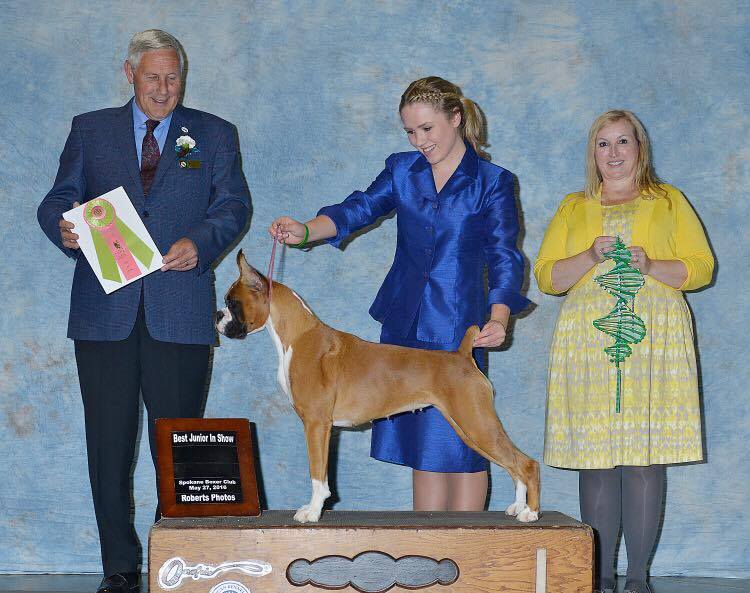
We would be overwhelmed with a multitude of intelligent, thought-provoking responses!
Juniors of all ages, aged-out Juniors, and Juniors that are now judging Juniors have a lot to say!
Here is a list of some of the best! Thank You!
Taylor Marshall, Rily DeVos Mars, Kelly Schur, Janelle Chamberlin, Kendyl Schultze, Jess Pearson, Alexzandra Erb, Shahntae Martinez, Cassie Noe, Abbie Marsh, Jeannette Mueller, Hannah Layne Hunyady, Shannon Jimenez, Vienna Yeadon, Lauren Elizabeth Weber, Annika Dechert, Anna Pearson, Caleb Campbell, Kim Bullard, Terri Brennan-Weiss, Kaitlin Derosier, Mallary Ross, Chloe Auld, Sylvia Miller, Gilliam McKim
Per Request
Yes, we will be publishing an article with all the responses! It will also be in our weekly newsletter, so if you aren’t on our mailing list… join us.
